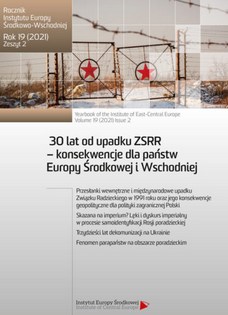30 lat rosyjskiej polityki imigracyjnej i jej znaczenie z perspektywy Federacji Rosyjskiej i obszaru poradzieckiego
30 years of Russian immigration policy and its significance from the perspective of the Russian Federation and the post-Soviet area
Author(s): Andrzej SzabaciukSubject(s): Political history, Government/Political systems, Political behavior, Transformation Period (1990 - 2010), Present Times (2010 - today), Migration Studies, Asylum, Refugees, Migration as Policy-fields
Published by: Instytut Europy Środkowej
Keywords: Russian Federation; migrations; migration policy; Central Asia; Vladimir Putin;
Summary/Abstract: The article aims to analyze the immigration politics of the Russian Federation from the perspective of the last three decades after the collapse of the Soviet Union. We have considered its importance from the point of view of the domestic and foreign policy of the state. Since 2000, with the beginning of Vladimir Putin’s first presidency, we have been observing a significant increase in the importance of the immigration policy of the Russian Federation, which was an important component of the Russian population policy and one of the key instruments to counteract the deepening depopulation of the state. However, the growing popularity of labor migration to the Russian Federation and the low effectiveness of managing migration flows resulted in a massive influx of irregular migrants, which have used some of the Russian political circles to fuel anti-immigration sentiments. Because of this politics, since 2007, we have been observing a gradual departure from the earlier model of immigration policy, open to labor migration from the Commonwealth of Independent States, towards a policy limiting the influx of Muslim migrants from Central Asia. At the same time Russian government have invited Russian-speaking people from the post-Soviet area to settle in Russia. The introduced restrictions allowed the Russian Federation to use the facilitation of access to the Russian labor market as an instrument encouraging the political and economic integration of the post-Soviet states within the structures controlled by the Russian Federation. The increase in the political component of immigration policy did not change the fact that it was thanks to the influx of people from the post-Soviet area that Russia avoided the depopulation that is currently observed in Ukraine. Analyzing the situation of the Russian Federation and its politics towards the post-Soviet region, the realistic paradigm was used as it best reflects the specificity of the region.
Journal: Rocznik Instytutu Europy Środkowo-Wschodniej
- Issue Year: 19/2021
- Issue No: 2
- Page Range: 365-378
- Page Count: 14
- Language: Polish

